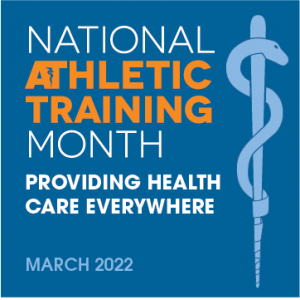From the Trainer’s Room: Why an athletic trainer?
“Providing Healthcare Everywhere.”
That is the 2022 slogan for National Athletic Training Month. But where is “everywhere?”
Athletic trainers provide a unique perspective and skill set that is valuable in many different settings. You can find athletic trainers in what is considered their traditional roles on the sidelines of high school games, professional sports, and on college campuses. You can find athletic trainers in the industrial setting, where they help employees with injury prevention and ergonomics. Athletic trainers are in hospitals, operating rooms, and doctors’ offices. They are also on military bases, providing care to our soldiers.
So what makes an athletic trainer so versatile? Why do you want an athletic trainer caring for you or your child?
 1. Athletic trainers specialize in injury prevention
1. Athletic trainers specialize in injury prevention
One of the most valuable, yet most difficult contributions to measure, is the injuries that never happened because of the athletic trainer’s work. Athletic trainers have the unique position of being present before an injury ever occurs, which uniquely allows them to implement injury prevention measures. Whether it’s a preventative strengthening program to protect against ACL tears, taping and bracing, or advice on workload management, there are countless injuries that have never happened thanks to the work of an athletic trainer.
2. Athletic trainers can provide emergency care
A phrase you may hear among the profession is “athletic trainers are paid for what you hope they won’t have to do.” But when the unthinkable does happen, having an athletic trainer present could be the difference between life and death. Athletic trainers all go through extensive education in managing cardiac emergencies, head injuries, life-threatening bleeds, among other catastrophic situations.
3. Athletic trainers are highly skilled healthcare professionals
A study in 2016 found that in 90% of cases, the athletic trainer’s diagnosis was the same as the physician’s. And in most cases, the athletic trainers are making those diagnoses using only their hands and training. Athletic trainers are usually the first to evaluate an injury, and so having the correct diagnosis right from the get-go is invaluable.
4. Athletic trainers are qualified to recognize and manage concussions
A hot button topic in sports-related injuries recently has been concussions. While it seems that there is incredible awareness regarding head injuries, it can be surprising how many healthcare professionals, including physicians, do not know how to recognize or manage a concussion. In addition, there are several states (including California) that have laws regulating the care of the concussed athlete. Athletic trainers are trained in recognizing concussions, managing a concussed athlete, and stay up-to-date on the best practices.
5. Athletic trainers get you back in the game faster
Athletic trainers are qualified to help you rehabilitate your injury and get you back on the field as quickly and safely as possible. Whether it’s a short-term ankle sprain or you’re in for the post-surgical long haul, your athletic trainer can help guide you through therapeutic exercises, mitigate your pain and symptoms, and get you back in the game stronger than before.
6. Athletic trainers prioritize your health and safety
Coaches are hired to win games. Administrators are there to make sure everything runs smoothly. Most athletes want to stay in the game at any cost. There are times that the athletic trainer is the only individual on that sideline that is prioritizing the health and safety of the athletes. Having a trained healthcare professional present that will protect the athlete, sometimes from themselves, is critical.
So why athletic trainers? Simply put, athletic trainers keep you doing what you love to do. And when you do injure yourself, they help you get through it safely so that you can go back to work or to the game or to your favorite activity as quickly as possible.
That’s why athletic trainers are providing healthcare everywhere.
Jenna is a certified athletic trainer and graduate of Plymouth State University, where she received her Master’s in Athletic Training. She currently sees clients at Compete Sports Performance and Rehab in Orange County, Calif., and serves as the athletic trainer for the Ontario Jr. Reign of the USPHL. She can be reached at jenna@competeperformance.com.
(March 17, 2022)









